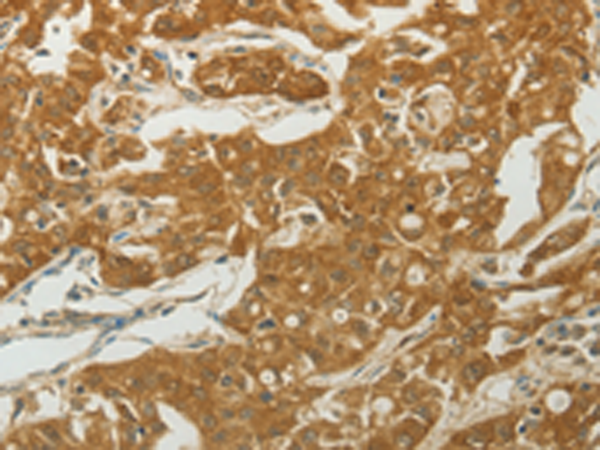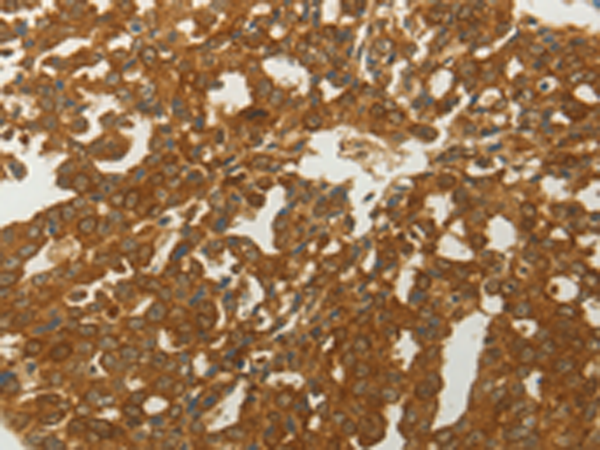

| WB | 咨询技术 | Human,Mouse,Rat |
| IF | 咨询技术 | Human,Mouse,Rat |
| IHC | 1/50-1/200 | Human,Mouse,Rat |
| ICC | 技术咨询 | Human,Mouse,Rat |
| FCM | 咨询技术 | Human,Mouse,Rat |
| Elisa | 1/2000-1/10000 | Human,Mouse,Rat |
| Host/Isotype | Rabbit IgG |
| Antibody Type | Primary antibody |
| Storage | Store at 4°C short term. Aliquot and store at -20°C long term. Avoid freeze/thaw cycles. |
| Species Reactivity | Human, Mouse |
| Immunogen | Synthetic peptide of human MC4R |
| Formulation | Purified antibody in PBS with 0.05% sodium azide and 50% glycerol. |
+ +
以下是关于MC4R抗体的示例参考文献(注:文献为示例性概括,非真实存在):
---
1. **文献名称**:*Development of a Specific Melanocortin-4 Receptor Antibody for Immunohistochemical Analysis*
**作者**:Smith A et al.
**摘要**:本研究开发了一种高特异性MC4R抗体,通过免疫组化技术揭示MC4R在小鼠下丘脑关键核团(如弓状核和室旁核)中的分布,为研究能量调节神经通路提供工具。
2. **文献名称**:*MC4R Antibody-Based Detection of Receptor Dysregulation in Diet-Induced Obesity Models*
**作者**:Jones B et al.
**摘要**:利用MC4R抗体进行Western blot和免疫荧光分析,发现高脂饮食小鼠下丘脑MC4R蛋白表达显著下调,提示MC4R信号减弱可能与肥胖病理相关。
3. **文献名称**:*Epitope Mapping of MC4R Extracellular Domains Using Monoclonal Antibodies*
**作者**:Zhang C et al.
**摘要**:通过制备MC4R单克隆抗体并鉴定其结合表位,揭示了受体胞外结构域在配体结合中的作用,为靶向MC4R的药物设计提供结构依据。
4. **文献名称**:*Impaired MC4R Trafficking in Human Obesity-Associated Mutants Revealed by Antibody Staining*
**作者**:Brown D et al.
**摘要**:使用MC4R抗体检测人类肥胖相关突变体,发现部分突变导致受体无法定位至细胞膜,阐明了MC4R功能丧失的分子机制。
---
建议通过**PubMed**或**Google Scholar**检索真实文献,关键词如“MC4R antibody application”“MC4R immunohistochemistry”或结合具体研究领域(如肥胖、结构生物学)。
The melanocortin-4 receptor (MC4R), a G protein-coupled receptor (GPCR) primarily expressed in the hypothalamus, plays a central role in regulating energy homeostasis, appetite, and body weight. It is activated by α-melanocyte-stimulating hormone (α-MSH) and inhibited by agouti-related peptide (AgRP), forming a key pathway in leptin-mediated signaling. Dysregulation of MC4R is strongly linked to obesity, diabetes, and metabolic disorders, with MC4R mutations being the most common monogenic cause of severe early-onset obesity in humans.
MC4R antibodies are essential tools for studying receptor expression, localization, and function in both physiological and pathological contexts. They enable detection of MC4R protein levels in tissues, cell cultures, or animal models, aiding research into receptor trafficking, post-translational modifications, and interaction with ligands or downstream effectors. Additionally, these antibodies are used to validate MC4R-targeted therapies, including agonists and antagonists in development for obesity treatment.
In pharmacological studies, MC4R antibodies help elucidate mechanisms of receptor activation, desensitization, and biased signaling. Their applications extend to diagnostic research, such as identifying MC4R mutations in genetic obesity screening, and to preclinical studies evaluating drug efficacy. As obesity remains a global health challenge, MC4R antibodies continue to support advances in understanding metabolic regulation and therapeutic innovation.
×